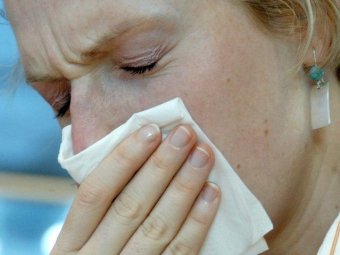Record numbers of Australians have been diagnosed with the flu this winter, prompting health authorities to renew warnings about vaccination.
Health Minister Sussan Ley said the latest figures showed more than 14,000 flu cases have been reported so far this year in Australia.
That compares to 9,258 cases at the same time last year.
Australia’s chief medical officer Professor Chris Baggoley said people at risk — such as those aged over 65, Aboriginal and Torres Strait Islander people, pregnant women and anyone with a chronic condition — should take advantage of the free vaccine.
“People who had the flu vaccine in 2014 need to have it in 2015, particularly this year, following a rare double strain change in the vaccine,” Professor Baggoley said.
Influenza is highly contagious, spreading easily from person to person, through the air and on hands.
“We need higher uptake [of the vaccine] in vulnerable groups. Immunisation is still the best form of protection from influenza,” Professor Baggoley said.
Four common questions about the flu vaccine
What is the flu?
Influenza spreads easily from person to person through infected droplets in the air and by hands. Vaccination is the single most effective way of preventing and stopping its spread.
Why should I get the flu shot?
This year, there is a rare double strain circulating, so the vaccine has been updated to reflect this.
Importantly, the flu vaccine does not contain any live virus therefore you cannot get flu from receiving the vaccine.
Who is eligible for the free flu shot?
The flu vaccine is recommended for everyone from six months of age but it is available free under the National Immunisation Program for people at high risk of complications. This includes pregnant women, Aboriginal and Torres Strait Islander people, people aged 65 years and over, and those with chronic conditions such as heart disease, severe asthma, diabetes and lung conditions.
Is the flu vaccine safe?
Yes, the flu vaccine is safe but can have minor side effects such as soreness, redness, pain and swelling at the injection site, drowsiness, tiredness, muscle aches and low grade fever.
Experts say side effects are usually mild and go away within a few days, usually without any treatment. You should contact your doctor if you are concerned or your child has a persistent high temperature.
How many cases of the flu are there where you live?
| Jurisdiction | 2010* | 2011* | 2012* | 2013* | 2014* | 5-year average | 2015* |
|---|---|---|---|---|---|---|---|
| ACT | 14 | 62 | 231 | 90 | 129 | 105 | 229 |
| NSW | 311 | 1,597 | 3,258 | 1,168 | 1,994 | 1,666 | 2,847 |
| NT | 40 | 343 | 186 | 172 | 298 | 208 | 84 |
| QLD | 473 | 3,195 | 2,623 | 1,494 | 3,011 | 2,159 | 4,064 |
| SA | 119 | 1,320 | 2,063 | 820 | 1,121 | 1,089 | 2,696 |
| TAS | 25 | 92 | 119 | 22 | 143 | 80 | 169 |
| VIC | 229 | 708 | 1314 | 943 | 1,610 | 961 | 2,457 |
| WA | 152 | 327 | 1267 | 541 | 952 | 648 | 1,578 |
| Australia | 1363 | 7,644 | 11,061 | 5,250 | 9,258 | 6,915 | 14,124 |
Source: NNDSS, extracted 6 July 2015
*For the period January 1 to July 6.

